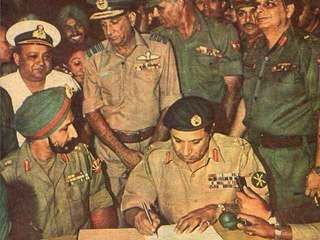So are Indian intelligence agencies who are often criticized and termed ineffective, really that bad? In this article, I am going to discuss a very old incident, Hijack of Fokker Aircraft, which happened just before the 1971 India-Pakistan war. Most Indians would be unaware of this incident.
Let me add a caveat before I continue with my article. This article contains my understanding of the incident and is based on my various reading I have done on this topic. This may or may not be the actual description of the events. India has never officially acknowledged its involvement for obvious reasons. It is unlikely to do the same ever, in pretty much the same way as Pakistan is unlikely to accept its support for terrorism.
Creation of Bangladesh was perhaps biggest ever success of RAW. The Fokker incident occurred before the start of the war but it proved to be an important event.
Background
India and Pakistan had been quarreling over Kashmir ever since independence. They had fought two wars in 1948 and 1965. By 1970, cracks began to appear between the West and East Pakistan - its two wings.
East and West Pakistan were separated by more than 1000 miles. Soon after independence, Urdu was proclaimed to be the national language of the wings even though Bengali was spoken by a majority of the Pakistanis. The Bureaucracy and Army was dominated by Punjabi's. There was considerable resentment among the East Pakistanis over dominance of the West.
By March, Pakistani army resorted to use of force and decided to crush the political movement. Mujibur Rahman was arrested and sent to prison in West Pakistan. The use of force was excessive and large number of Bengalis were killed. A huge number of Bengali women (mostly Hindu) were raped by the Pakistani army. Survivors have compared it to the Nazi extermination of Jews. This led to a large number of Bengalis seeking refuge in India. India decided to extend all help to the refugees.
President Yahya Khan held fair and free elections in December, 1970 in which Awami League of Shaikh Mujibur Rahman won a majority largely due to his Six-Point manifesto. National Assembly was to hold its first session in Dacca on 2nd March, 1971. It was, however, sabotaged by vested interests of West Pakistani establishment and some leading politicians, who were not willing to accept a Bengali-led government. (Source)
Strategies
India and Pakistan had two different strategies. Pakistan was aware that India could come to help the East Pakistanis. Therefore its plan was to devote more men and material for West Pakistan.
The Pakistanis would concentrate their forces in the West and thereby aim at capturing as much as Indian territory as possible. The Indians, on the other hand, would be fighting a war on two fronts (while at the same time keeping a fearful eye on the Chinese borders). Given this scenario, the Pakistanis felt that India at best would be able to capture some territory in East Pakistan and lose quite a bit in the West. In the end, the Pakistanis knew that the Western powers would intervene to stop the war and what would matter is who had the most of the other's territory. (Source)
They were hoping for a stalemate just as had happened during the 1965 War. Indian plan was essentially to liberate East Pakistan as quickly as possible. On its Western sector, it had essentially planned to defend with much smaller units and had much fewer offensive plans.
The Fokker incident
On January 30,1971, brothers Hashim and Ashraf Quereshi of the Jammu & Kashmir Liberation Front, armed with a pistol and a hand grenade, hijacked Ganga, a Fokker Friendship aircraft of the Indian Airlines (IA), after it had taken off from Srinagar for Jammu and forced the pilot to take it to Lahore.
After the aircraft had landed, Zuklfiquar Ali Bhutto, then Foreign Minister under Yahya Khan, rushed to Lahore, fraternized with the hijackers and helped them get maximum international publicity for their cause. On February 1, he persuaded them to release the crew and passengers who were sent by road to Amritsar. (Source)
Was the hijack staged
Pakistan has consistently alleged that this hijack was staged by Indian intelligence agencies. Soon after the hijack, India banned all Pakistani flights over its airspace. This meant that the distance between West and East Pakistan became three times the orginal distance and thus made it more difficult for Pakistan to transfer resources from West to East. It may have played its part in the overall outcome of the war.
The aircraft was hijacked by two Kashmiris, Butt and Hashim Quereshi. One of them was a Border Security Force man. What made the affair curious was the fact that Ganga was one of the oldest aircraft in the Indian Airline fleet and was already withdrawn from service but was re-inducted days before the 'hijack'. Even more tellingly, a deputy inspector general of the BSF based in Jammu, bristling at the involvement of one of his men in hijack, had gone public to say that he had objected to the induction of Butt into the BSF but was overruled by a 'higher intelligence agency'. (Source)Conclusion
From the prima facie , it does appears that the hijack was staged by Indian intelligence agencies. In hindsight it appears to be clever plan that worked perfectly. Though there are some unanswered questions. Like why was Quereshi arrested by Indians when he returned back to India.
This surely is gratifying for an ordinary Indian that its intelligence agencies are capable enough to do something like that. Indian agencies have consistently maintained a low profile as compared to other agencies like CIA or Mossad. There are rarely any publicity or movies made on RAW's operations.
The reasons are best known to the people in-charge. I only hope that they are still carrying on their good work.

